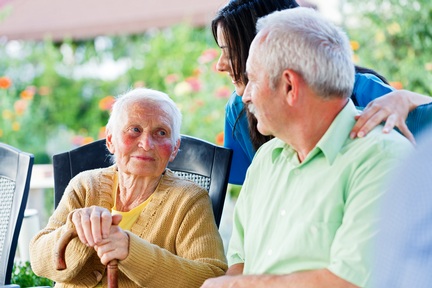Sex in care homes: Satisfying the sexual needs of residents
Sex is not just a past time for the young, it is for those considered well ‘past it’ and although people over 70 and 80 have active sex lives, many feel the care home sector is not keeping up with their needs.

One quarter of men aged 85 or over and one tenth of women at this age have had sex in the last year, according to the responses of 1,405 men and 1,677 women in the English Longitudinal Study of Ageing (ELSA) 2012.
“Romantic relationships are a fundamental part of people’s life – not just at a young age, but throughout the life-course. And yet, sexuality among older people is understudied at best and neglected at worst”, says Cesira Urzì Brancati, research fellow at the International Longevity Centre-UK, which analysed the ELSA data.
This is a view shared by the Royal College of Nursing (RCN) and the Care Quality Commission which is calling on care homes to step up and take a proactive stance when it comes to meeting residents’ personal sexual needs.
‘Do you still have appetites John?’
To get to the bottom of what sexual activity means to older people, research has uncovered a number of truths. For instance, when residents and their partners were questioned by researchers linked to Edge Hill University’s OPUS ('Older People’s Understanding of Sexuality’) study, intimacy was for some, more important than sexual intercourse.
When researchers went into care homes to ask residents about sexual activity, the response was mixed. 78 year-old William said: “Nobody talks about it... Nobody practices it. We’ve had our sex life way back... Have you had a look around here at some of these [people]? They’re that bloody old, they’ve got cobwebs on ‘em.”
Despite some residents reinforcing stereotypes that they were ‘past it’ others signaled they had healthy sexual appetites even in spite of suffering age-related conditions but their care homes was not meeting these needs.
'Can't even have a cuddle lying down'
Olivia admitted: “I know in this home there are double rooms but there’s not many.
“We can’t even have a cuddle lying down... ‘Do you still have appetites, John, with your Parkinson’s?’”
"Do bears sh*t in the woods?” was her sixty-two year-old partner John’s response.
The sight of an older couple holding hands while sharing a park bench may be considered a vision of romance of those in their 'twilight years', but sharing a bed in a care home is a trickier aspiration and does require sensitive action by staff. As Olivia points out, some care homes provide double beds for residents, others do not.
On the subject of their desires, Olivia says: “Well it’s just togetherness... If you’ve been married for a long, long time they need each other, even if it’s to hold hands and have a cuddle. It’s just support isn’t it; it’s just knowing that somebody’s there for you.”
She had some advice for care workers: “It’s a very private thing. Honour somebody’s privacy. If their door’s shut, is it shut for a reason?”

Although the evidence for older people’s sexual activity and their desire exists, some care home residents are left to look but not touch when it comes to kissing, fondling, masturbation, petting and sex. Just the thought of these activities can leave care workers in a dilemma about what approach is required.
Taboo in the care sector
Sex and sexual activity amongst residents can be a minefield for the care home sector, with staff not wanting to expose themselves to sex abuse claims or accusations that they let residents be the victim of ‘uninvited’ sexual advances.
One care worker said: “…they’ve obviously got that need and want to express it but can’t because of the capacity and does that lady know what he’s doing? Does she actually want him to do that? It’s mind-boggling, really.”
Dr Tuppy Owens, a qualified sex therapist, who volunteers to answer calls to the Sex and Disability helpline says: “In the old days, sex workers were brought in and nobody said anything. Some care homes still allow sex workers or they take residents to a massage parlour but they are just not talking about it. A lot of people think sex work is illegal and think phoning them up is illegal.
"I’ve heard of a care home where a woman asked for a vibrator and staff said no.
"If there is a woman who fancies one of the men, she may think 'what’s the point' because she can't get the support she needs to be intimate with him.

“Staff should talk to residents about their desires and what they want to do about them. They should be open. There should be provision whether it be access to porn on TV, access to a designated room with a double bed. There should be privacy such as knocking on bedroom doors before entering."
Loss of inhibitions
When it comes to satisfying residents, some in the sector feel dementia adds a layer of complexity to the confusion over the best approach. The Alzheimer’s Society says those with dementia can experience an increased or reduced interest in sex, a loss of inhibitions or form a relationship with someone new, when they still have a partner.
Lynn (in her 50s) has frontotemporal dementia and is in a nursing home. She has no inhibitions sexually and frequently touches the breasts and bottoms of staff and other residents. She uses sexual language and has propositioned residents for sex. Her husband Grant (also in his 50s) lives at home and takes Lynn home every weekend. Staff believe they have sex but do not think she has the capacity to consent to it.
Elizabeth Lightbody a speciality trainee in old age psychiatry, writing in In the Journal of Dementia Care, says: “Staff do not need to make immediate decisions about someone’s capacity to consent to a sexual relationship. Capacity assessments should be multidisciplinary and informed by repeated observations over a period of time.” She says before making a decision, staff should consider whether Lynn recognises Grant and knows him as her husband. "Can she say what she wants? Is her behaviour similar to her behaviour before she became ill? What is known about her previous sexual values and can Lynn take precautions against risks?”
The morning after
Those with dementia may form new relationships with other care home residents and could also forget they’ve had sex or been intimate with someone, which could upset their partner. They may also become more sexually aggressive, which can have negative implications for partners, other residents and staff.

Educating staff
The Alzheimer’s Society recognises care homes need direction to meet sexual needs and echoes the RCN’s recommendation of staff training, to enhance the private life of residents in couples.
A few years ago, care provider Family Mosaic arranged for sex trainers to teach staff to see sexual activity as a natural part of life for older people. The training began but was dropped after the group said they faced a range of legal issues.
In a statement the group said: ‘Around two years ago managers within Family Mosaic undertook four external training sessions to support their customers with their sexual needs. Following these sessions and some further exploration around legal issues related to this issue, we decided to postpone any further work within the field.
'Staff within all our services continue to support customers with a range of issues in a person-centred way to enable them to achieve their goals and live as independently as possible'.
Family do not approve
If staff consider the requests of loved ones outside the care home setting who resist the idea of their family member having sex in the care home, the stakes can be higher. But, many care homes are used to putting the needs of their residents before loved ones residing outside care homes. Dr Tuppy Owens says meeting the sexual needs of residents should be in the legal contract residents sign before entering a care home.
To provide some clarity for care workers, the RCN's report 'Older People in Care homes: sex, sexuality and intimate relationships' stated: “The fundamental principles of individual autonomy, choice and consent are established in law and underpinned by the Human Rights Act 1998 and assumptions and stereotypes should be challenged.”
It says care homes should have policies that support the rights of all residents by offering environments that celebrate individual rights and choices in sexuality expression and intimate relationships. The RCN emphasized that staff training must also deal with issues of intimate relationships and sex.
Following requests to care homes for information on how sexual needs of residents are met and whether the matter is addressed in staff training/ a sex policy or inclusion in residents’ care plans, only one care group explained the practical steps it is taking in this area. The reluctance of too many care homes to voice publicly their actions, may indicate the legal minefield they feel they are in.
Porn and sex toys
Hallmark Care Homes did come forward with some answers. Kieron Walsh, regional director for Hallmark Care Homes said: “We continue to support and have supported residents’ sexual needs in the past by buying them pornographic material and sex toys.”
Residents in a relationship are also given king-size beds. The group does not currently have a sex policy in place, however there is one in the pipeline.
Julie Rayner, care, quality, governance and compliance director for the group explains “We are currently developing an ‘Intimate Relationships’ policy which will be developed with input from residents and team members.
"The policy will be launched alongside a full awareness programme for our team members to ensure that residents are supported in an appropriate and sensitive manner. We fully support our residents in our care homes that have capacity to participate in an intimate relationship.”
The chief executive of Care England, Martin Green says: “Delivering personalised care is the objective of all good care services and it should be remembered that sexuality is a very important part of who we are.
“Care plans should be sensitive to people's sexual and emotional needs, and care providers, must at all times, give residents the privacy and dignity that will enable them to maintain their personal and sexual identity."
Sexual revolution
In contrast to residents of the sexually-restrained 40s and 50s, the free-loving revellers of the swinging sixties are entering care homes and with it the sexual demands of residents will grow. The question is: are care homes enlightened enough to resolve their own sexual issues?
Latest Features News
 25-Nov-19
2019 Election: Boris Johnson leaves social care in 'too difficult box' but Labour vows to end 'crisis'
25-Nov-19
2019 Election: Boris Johnson leaves social care in 'too difficult box' but Labour vows to end 'crisis'
 18-Oct-19
Podcast: Wendy Mitchell and dementia: 'My biggest fear is not knowing who my daughters are'
18-Oct-19
Podcast: Wendy Mitchell and dementia: 'My biggest fear is not knowing who my daughters are'
 27-Sep-19
Exclusive: Care minister backs care workers' call for time off to grieve and attend funerals
27-Sep-19
Exclusive: Care minister backs care workers' call for time off to grieve and attend funerals
 19-Sep-19
Podcast: Gyles Brandreth says poetry helps ward off dementia
19-Sep-19
Podcast: Gyles Brandreth says poetry helps ward off dementia
 30-Aug-19
Edinburgh Fringe funnyman joins comics facing toughest audience at care home gig
30-Aug-19
Edinburgh Fringe funnyman joins comics facing toughest audience at care home gig